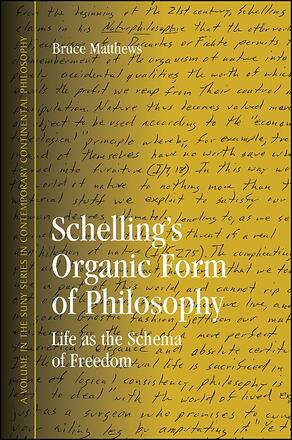Preface
Acknowledgments
Notes on Sources and Abbreviations
1. Life as the Schema of Freedom: Schelling’s
Organic Form of Philosophy
Subjectivism and the Annihilation of Nature
Immanent Reconstruction
Kant and the Categorical Imperative of Unity in Reason
Plato’s o(do/j and the Eternal Form of Philosophy
Organic Unity and Nature’s Redemption
Ideas in situ: Embedded Thought
2. Beginnings: Theosophy and Nature Divine
The Acculturation of a Prophet of Nature
The Discipline of Language and Actuality of the Past
The Tradition of Pietism: Freedom as the Unmediated
Experience of the Divine
Halfway between Tradition and the Enlightenment: Theosophy and the Divinity of Nature
Oetinger’s Genetic Epistemology and the Unmediated Knowing of the Zentralerkenntnis
Divinity as Freedom in Nature: The Priority of Freedom over Wisdom
Schelling’s Eulogy and the System of Philipp Matthäus Hahn(1739–1790)
A Theology of Life
Procreative Logic: Hahn’s “ordo generativus”
Systema Infl uxus: The Immanent Harmony of the Trichotomy of Body, Soul, and Mind
Life in the Anticipation of the Eschaton: The Prophet of Freedom and Nature Divine
Schelling’s Eulogy of Hahn(1790)and the Passing of the Flame of Prophecy
Prophet of the New Religion of Nature: Matter Spiritualized
3. The Question of Systematic Unity
Systematic Unity and the Urform of Reason
Life Is the Schema of Freedom: The Will of Desire and the Causality of Freedom
The Antinomy of Aesthetic Judgment
The Unity of the Ideas of Reason and the Transcendental Ideal as the Form of Forms
Transcendental Modality: Unity as Grundsatz of Reason
Weltbegriffe and Naturbegriffe: The Limits of a Mathematical World in the Face of the “Absolute Selbsttätigkeit” of Nature
The Urform of Reason: ai( suna/pasai e)pisth=mai
The Logical Visage: The Prinzipien of Unity, Manifoldness, and Continuity
The Idea of the Maximum as the Analogon of the Schemafor the “Prinzipien der Vernunft”
The Transcendental Ideas: The Figurative Guarantors of Reason’s Extension
Aesthetic Ideas, the Sublime, and the Internal Intuition of the Supersensible Ground
Genius: Autoepistemic Organ of Nature?
4. The Timaeus Commentary
To Seek the Divine in Nature
Schelling’s Commentary on the Timaeus
The Divine Ideas of Reason to\ kalo/n as the Ideal of Unity and Completeness
The World Soul as “The Ideal of the World”: Organic Life as a Principle of Systematic Unity
Immanent Preestablished Harmony: The Condition of Possibility of Einheit
The Ideas: Existence Is Not a Predicate
The Threefold Form of All Knowing
Plato’s Urform
5. On the Possibility of a Form of All Philosophy: The Form Essay
Schelling’s Original Insight
The Urform of All Forms
Kant’s Progressive Method: The Removal of the Time Condition as the Condition of Comprehending an Absolute Magnitude
Reciprocal Establishment of the Urform
The Progressive Method of Disjunctive Identity
The Urform of Relation
Philological Justification
Epistemic Positionality and the Removal of the Time-Condition
Form of Being Unconditionally Posited: ‘I = I’
Form of the Conditioned: NichtIch = Nicht Ich (Nichtich ≠ Ich)
Form of Conditionality Determined by Unconditionality = Consciousness
Disjunctive Identity
6. Freedom and the Construction of Philosophy
The Dynamic Process: Producing the System of Identity
The Self Versetzt: Freedom as the Postulate of Philosophy
The Method of Construction: Einbildung as the In-Eins-Bildung of Duality
Problematic: All Philosophy Is Construction
An Aesthetic Philosophy
The Construction of the Self: Theoretical Philosophy and Unconscious Nature
First Epoch: Productive Intuition of Sensation through the Restriction of the Past
Second Epoch: Transition from Blind Intuition to Reflection through the Restriction of the Present
Third Epoch: From Reflection to the Absolute Act of the Will
The Derivation of the Categories from Time
Transition to Practical Philosophy: The Absolute Act of the Will
Time and Historicity
The Tense of the Absolute: Futurity
The Endless Process
Appendix “Eulogy Sung at Hahn’s Grave”
Notes
Index
